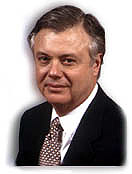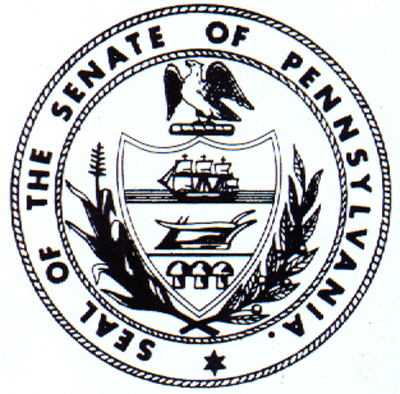|
|
||||||
SB 1209 WEAKENS STATE GAMBLING LAW HARRISBURG, November 20, 2004 – The state Senate today passed legislation that weakens restrictions on the family members of public officials owning or working for a slots operation, and weakens business and employment opportunities for Pennsylvanians. In approving SB 1209, the Senate voted to strip from the state gambling law a limitation on most family members of public officials having a financial interest in a slots operation, and to strip an outright ban on them working for a gambling licensee. If the bill were to become law, the adult children, siblings and parents of legislators and most other public officials would be able to have an unlimited interest in slot licenses, up to and including 100 percent. They could also be employed by gambling enterprises. Under the state gambling law enacted in July, Act 71, all immediate family members of public officials would have been limited to owning no more than one percent, and they would have been precluded from working in the industry. SB 1209 passed the Senate today on a near party-line vote of 28-19, with mostly Republicans supporting the legislation. It now goes to the House of Representatives, and if it is approved there, to the Governor. "You will now permit members of the Senate to ask slot operators to hire their relatives. You will now permit family members of the Attorney General or the head of the State Police to own a slot venue," said state Sen. Vince Fumo (D-Philadelphia), during the debate on the Senate floor. "Under the guise of closing the one percent loophole, we’re opening up a huge, not loophole, but a garage door. This is horrible public policy." Only spouses and minor children (who are legally ineligible anyway) of public officials would be banned from the industry under SB 1209. "We are going to urge the Governor to veto this corrupt piece of legislation," Fumo said. SB 1209 also strips from the gambling law a provision designed to create business and employment opportunities for Pennsylvania citizens in the new slots industry. Act 71 contained a provision requiring that out-of-state slot machine manufacturers sell and service their products in Pennsylvania using in-state distributors. "We wanted to be sure that Pennsylvania companies had an avenue to become involved in the new gambling economy," said Fumo, one of the prime authors of Act 71. "It was a tangible benefit to Pennsylvania companies and Pennsylvania workers." For example, Fumo recently received a letter from officials of Keystone Transport Systems in Emigsville, Pa., asking him to oppose SB 1209 because it repeals the distributorship requirement. The company was planning to compete for business from out-of-state slot manufacturers, servicing Pennsylvania slot venues and, in the process, creating jobs for local workers. In the letter to Fumo, company officials Chad L. McNaughton and Arthur R. Krall, wrote: "The three manufacturers that we have spoken to have now stated (since the passing of SB 1209) that they would run everything direct and keep the jobs/revenue in their own state. The language of Sections 1317 and 1317.1 would allow those manufacturers to prevent anyone in the Commonwealth from competing for this new business regardless of how anyone feels about gaming (support or don’t support in PA.)" SB 1209 would also delay the implementation of the gambling bill through various procedural roadblocks, and thus delay the opportunity to deliver property tax relief (and Philadelphia wage tax relief) to Pennsylvania citizens. Included with this news release are several attachments detailing regulatory regressions and procedural problems contained in SB 1209. # attachment
PROBLEMS WITH SB 1209 CHANGES TO THE STATE GAMBLING LAW Family Members Act 71 as enacted bans financial interest greater than one percent in a slots operation by any public official and his immediate family. The definition of immediate family parallels the one in the state Ethics Act, applying to spouses, unemancipated children, siblings and parents. (It differs slightly from the Ethics Act, which includes all children.) SB 1209 applies that broad definition of family to members of the Gaming Board and lesser employees of the Gaming Board, even secretarial and custodial workers, and prohibits them from owning any interest in a slots operation. Significantly, there are no exemptions for them for mutual funds, retirement accounts, etc. However, when it comes to public officials, which includes legislators, officers such as the Attorney General, and some local officials, SB 1209 applies the financial interest ban only to the official, his or her spouse, and minor children. Therefore, the sibling, parents, and adult children of legislators and many other officials could own any percentage of a slots operation, up to and including 100 percent. The original Act 71 limited all relatives to one percent. So a brother or adult child of a custodial worker or file clerk at the Gaming Board office is held to a stricter standard for financial interest in a slot operation than a parent, sibling or adult child of a state Senator or the Attorney General. SB 1209 also permits siblings, parents and adult children of public officials to work directly for a gambling operation. This is prevented under Act 71 as enacted. Other Financial Interest Issues SB 1209 removes the prohibition against political party officials from owning slot venues so long as it is not in the officials’ home county. Thus, a party chairman in Montgomery County could own a slot parlor in Bucks County, etc. SB 1209 allows municipal officials to own a slots venue, as long as their municipality does not receive a direct distribution of slot proceeds from a slot parlor. Thus, the mayor of Harrisburg could own Penn National. SB 1209 allows most county officials to own a slot operation, even in their home county. So the district attorney or county commissioner could own any portion of a slots operation, so long as the county does not receive a direct distribution of money from the slot venue, which most do not. (Most counties and municipalities will receive their distribution of slot proceeds through the state Department of Community and Economic Development, not directly from the slot operator.) SB 1209 allows non-elected or non-executive department officials to own a slot venue. Thus members of the Pennsylvania Convention Center Authority or the Delaware River Port Authority could own a slots venue. School Board members, who vote on property tax matters, are specifically exempted from the ban, and may own a slots venue. Act 71 as enacted bars ownership stakes of more than one percent among all of the above categories of officials. Procedural Delays Parts of SB 1209 bill seem designed to delay tax cuts, probably beyond 2006 when Governor Rendell runs for re-election. Several things seem intended merely to throw up procedural roadblocks that will slow down the approval and operation of slot facilities. Among the delaying tactics are: Applying the financial interest prohibition to non-supervisory employees of the Gaming Board, such as secretaries, clerks, assistants, and custodial workers; Requiring a background investigation of every employee or contract employee of the Board, down to the level of secretaries, clerks, assistants, and custodial workers; Applying the Commonwealth Procurement Code to the Board, thus forcing it to go through a lengthy competitive bidding process for ordinary start-up tasks, even buying pencils; Removing the confidentiality of information submitted for background investigations – including information such as social-security numbers, financial information, and other private information that would involve not only the applicants, but family and business associates of the applicant. Mandating that manufacturer and supplier licenses be renewed every year. It will be practically impossible to go through a license renewal process every year for every manufacturer and supplier. In fact, the New Jersey Assembly recently passed legislation that would extend the renewal period for casino licenses to 5 years. Mandating that occupational licenses for casino workers are to be renewed each year – for every occupational license. That is a huge number that will be virtually impossible to address. This should be removed, and the Board should be permitted to determine if or how often such licenses should be renewed. Benefit to PennNational SB 1209 removes a section of Act 71 that requires PennNational Corporation to divest its interest in one of its two racetracks in the state. SB 1209 allows anyone to own as many slot venues as possible, and permits PennNational to back out of an agreement to sell one of its tracks, or to purchase any number of other slot venues. Similarly, other slot operators could acquire a second or more venue. Act 71 bans any slot operator from owning more than a 33 percent interest in a second venue. Withdrawal of Money from Property Tax Relief Fund The House added a provision to the SB 1209 that could cut into the amount of property tax relief promised by the slots law. The bill now dictates that the slots-funded Property Tax Relief Fund make up for any shortfall from the previous year that may occur in the state Lottery Fund, regardless of its cause. Distributorships This bill eliminates the requirement that slot machine manufacturers sell to slot parlors through a Pennsylvania-based distributor. Distributorships are the only provision of the bill that will definitely create business opportunities for Pennsylvanians. They are the most likely opportunity for minority-owned business to participate in the slots industry. They will creates jobs for Pennsylvania workers to deliver, install and service machines. They ensure that the sale, installation and servicing of machines is done by a business that falls under the regulatory jurisdiction of the Pa. Gaming Board. Many of the slot licensees will be out-of-state companies. Some large gambling companies have already partnered with existing racetracks and other likely license applicants. Thus, without this provision, they will bypass Pennsylvania’s economy. Removing the provision helps no one other than out-of-state machine manufacturers. In addition to benefitting out-of-state manufacturers by eliminating the distributorship requirement, SB 1209 allows slot operators to manufacture and sell their own machines. |


